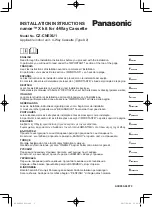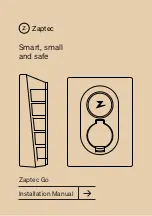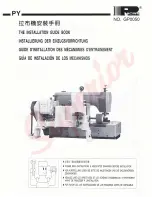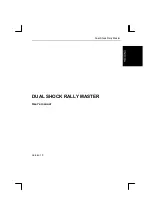
4 - WORKING OPERATIONS
4-20
Operating Hints
Follow this procedure when placing the Kwik-Pit into it’s
working position:
• Keep the hopper full for maximum capacity. Most efficient
results will be obtained when flow of incoming material
is directed to the center of the hopper.
• Always listen for any unusual sounds or noises. If any
are heard, stop the machine and determine the source.
Correct the problem before resuming work.
• Do not run the machine for long periods of time with no
material on the belting. This increases belt wear. Try to
run only when moving material.
• The hopper is designed with flashing to seal the junction
of the belt with the sides of the hopper. It must be kept
in good condition to prevent the material from “leaking”
out of the hopper. Replace flashing if “leakage” occurs.
(See"Conveyor Belt Speed Control"
• Conveyor Belt Tension: (For tensioning the conveyor belt)
(See"Conveyor Belt Tension" on page 5-8)
There may be a rapid decrease in belt tension during the
first few hours of operation until the belt has worn in.
The correct operating tension is the lowest tension at
which the belt will not slip under peak load conditions.
Conveying Fertilizer
Fertilizer may be conveyed using the conveyor when strictly
operated at reduced capacity and additional care is taken to
thoroughly clean the conveyor after operation.
IMPORTANT
Fertilizer weakens the belt lacing and warranty is void on
all lacing used with fertilizer. The belt lacing may need to
be replaced more often if you convey fertilizer.
Additional Operating Requirements
To prevent problems that can be caused by conveying fer
-
tilizer:
1. Do not allow fertilizer to fill over the edge of the belt. This
will allow fertilizer to get under the belt and start building
up.
2. Reduce the flow of material if the conveyor belt starts to
slip. Denser fertilizers will slow the conveyor belt down
due to the weight of the product. Excesive belt loading will
cause the drive roller to slip and lead to additional wear on
the roller.
3. Do not move fertilizer with your Kwik-Pit in humid, wet or
rainy conditions. This will cause buildup of fertilizer under
your conveyor belt.
Additional Clean-Out Procedures
Proper cleaning will help to ensure longer belt life and prevent
excess rust formation.
1. Run conveyor empty at full speed for 5-10 minutes after
conveying fertilizer. This will help ensure that any product
that may be under the belt will be cleaned out and prevent
build up.
WARNING
Do not attempt to manually remove build-up while con
-
veyor is running.
2. Run the belt at low idle and inspect for damage on the belt
and lacing, such as notches or cut outs caused by mice and
normal wear. Any damage on the belt may result in fertilizer
getting under the belt creating a buildup. Consider replac-
ing the conveyor belt if it is in poor condition. If equipped
with an electric motor, inspect on the belt return side with
the electric motor not running. Turn on the conveyor to
expose the belt that was previously in the tube. Turn off
the conveyor and inspect the belt on the belt return, along
with the lacing.
3. Shutdown and lockout power to the conveyor and vacuum
or sweep out any remaining fertilizer from the hopper.
4. If buildup is evident on or under the belt, remove the
buildup to ensure proper operation of the conveyor. When
necessary remove fertilizer buildup from under the belt by
scraping and washing the belt.
Summary of Contents for Kwik-Pit 26 Series
Page 2: ......
Page 10: ...1 4 1 GENERAL INFORMATION This Page Is Intentionally Left Blank...
Page 46: ...2 SAFETY INFORMATION 2 36 This Page Is Intentionally Left Blank...
Page 58: ...3 TRANSPORT OPERATIONS 3 12 This Page Is Intentionally Left Blank...
Page 116: ...5 MAINTENANCE 5 38...
Page 118: ...5 MAINTENANCE 5 40 This Page Is Intentionally Left Blank...
Page 120: ...6 TROUBLESHOOTING 6 2 This Page Is Intentionally Left Blank...
Page 126: ...8 FORMS AND DECLARATIONS 8 2 This Page Is Intentionally Left Blank...
Page 132: ......
















































